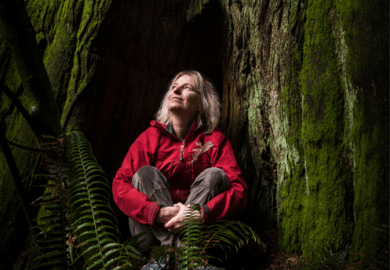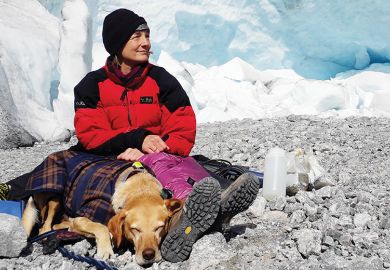The world knows Charles Darwin as the great biologist who formulated the theory of evolution by natural selection, based on his observation of variation between closely related living species. It deserves to be far more widely recognised that, in his early years, he was by inclination and training first and foremost a geologist. Throughout his long career, he acknowledged the essential role that geology had played as background to his work on evolution, which culminated in his publication of On the Origin of Species by Means of Natural Selection in 1859. In her timely book, Sandra Herbert provides recognition of Darwin's geological persona for a wider public.
Darwin had attended geology courses at Cambridge University during 1828-31, but he graduated in a traditional mixture of classics and mathematics before geology degrees became available. Greatly influenced early on by several pioneering geologists of his day, he declared in 1831:
"I am now mad about geology." By this time, geologists had begun to detail the worldwide succession of sedimentary rock strata containing a multitude of fossilised creatures, then widely regarded as successive individual creations of ever-greater complexity.
In this intellectual climate, Darwin embarked as a self-financed independent researcher on his epic voyage on HMS Beagle (1831-36), which surpasses all other individual scientific explorations in imagination, productivity and achievement. Using copious extracts from Darwin's diaries, notes and correspondence on the voyage, Herbert shows in her linking commentary how Darwin's entire future scientific output was shaped by these five intense years of virtually single-handed geological observation and theorising, combined with copious collecting of fossils and living creatures - mostly in South America. Indeed, we learn that Darwin spent only 18 months out of five years on board ship. One can only marvel at how one man could have achieved so much profound thought and creative work in such a confined and isolated environment.
Darwin's geological preoccupations on the voyage were mainly about such varied topics as the rocks of South America, the structure of the Andes mountain range, the origin of volcanoes and of the different types of erupted lavas, the significance of coral reefs in relation to uplift and subsidence of land and to the rise and fall of sea level, the relationship between fossils of large vertebrates and apparently related modern creatures, and much else.
In the early 1840s, Darwin published several well-known books and papers on some of these topics and was regarded primarily as a distinguished geologist. At one time, he was a secretary of the Geological Society of London, and in 1859 he received the society's premier award (the Wollaston Medal) just before publication of the Origin . In a letter to Alfred Russel Wallace in 1860, Darwin writes: "I think geologists are more converted [sic] than simple naturalists because more accustomed to reasoning." That sentiment would not be out of place even today.
Herbert makes clear that whenever Darwin had to decide between previously conflicting geological hypotheses, he usually favoured what, with hindsight, is the more modern view. In a particularly interesting chapter, "Negotiating Genesis and geology", she describes how Darwin's interpretation of geological evidence early on caused him to sever all links with the biblical version of Genesis and of the universal flood.
Indeed, quite early in his career he was already thinking about integrating human and geological history, even without the biblical flood.
By 1837, Darwin confessed more widely that he was contemplating the gradual "transmutation" of species, and by the mid-1840s his primary creative activities had turned away from geology to his far-reaching biological pursuits. But even in the Origin, two chapters are devoted to geology. In time, Darwin's geological contributions, important as they are, were understandably overshadowed by the revolution of evolution.
Herbert charts every aspect of Darwin's geological activities throughout his career with creative insight, especially as regards the significance of his geological background and achievements for the eventual full-blown understanding of evolution and natural selection. The detailed evidence unfolds systematically and clearly throughout the ten chapters. No one interested in Darwin and evolution, or the development of geological thought in the first half of the 19th century, will want to miss this book.
In addition, there are 80 pages of notes on the text, a full bibliography and an efficient index. Even a description - with photographs - of Darwin's geological field equipment finds a place in the well-illustrated text.
The main conclusion of the book is that geology, through Darwin, contributed an immense amount to the establishment of evolutionary theory, but that geology was itself profoundly affected by it from then on.
Nowadays most geologists study evolutionary theory as part of palaeontology and palaeobiology, and they will be proud to learn that Darwin was really one of them. I regard Herbert's book as a fitting tribute to a great human being and creator of a brave new world, who was himself a triumphant product of at least 3 billion years of the majestic and unpredictable process of evolution.
Stephen Moorbath is emeritus professor of earth sciences, Oxford University.
Charles Darwin, Geologist
Author - Sandra Herbert
Publisher - Cornell University Press
Pages - 485
Price - £22.95
ISBN - 0 8014 4348 2
Register to continue
Why register?
- Registration is free and only takes a moment
- Once registered, you can read 3 articles a month
- Sign up for our newsletter
Subscribe
Or subscribe for unlimited access to:
- Unlimited access to news, views, insights & reviews
- Digital editions
- Digital access to THE’s university and college rankings analysis
Already registered or a current subscriber?



